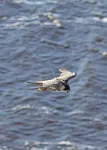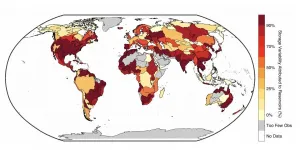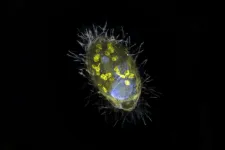INFORMATION:
The paper, Climate-driven flyway changes and memory-based long-distance migration, is attached as a PDF and can be found here after the embargo
Professor Mike Bruford is available for interview
Images of the tagged Arctic peregrine falcons are available here
For further information and interview requests contact:
Gerry Holt,
comms & marketing,
Cardiff University -
029 2087 5596 or
HoltG2@cardiff.ac.uk
Cardiff University is recognised in independent government assessments as one of Britain's leading teaching and research universities and is a member of the Russell Group of the UK's most research intensive universities. The 2014 Research Excellence Framework ranked the University 5th in the UK for research excellence. Among its academic staff are two Nobel Laureates, including the winner of the 2007 Nobel Prize for Medicine, Professor Sir Martin Evans. Founded by Royal Charter in 1883, today the University combines impressive modern facilities and a dynamic approach to teaching and research. The University's breadth of expertise encompasses: the College of Arts, Humanities and Social Sciences; the College of Biomedical and Life Sciences; and the College of Physical Sciences and Engineering, along with a longstanding commitment to lifelong learning. Cardiff's flagship Research Institutes are offering radical new approaches to pressing global problems. More at http://www.cardiff.ac.uk
Scientists find strongest evidence yet of 'migration gene'
Researchers combined satellite tracking and genome sequencing to pinpoint specific gene
2021-03-03
(Press-News.org) A team from the Chinese Academy of Sciences and Cardiff University say they have found the strongest evidence yet of a "migration gene" in birds.
The team identified a single gene associated with migration in peregrine falcons by tracking them via satellite technology and combining this with genome sequencing.
They say their findings add further evidence to suggest genetics has a strong role to play in the distance of migration routes.
The study, published today in the journal Nature, also looks at the predicted effect of climate change on migration - and how this might interact with evolutionary factors.
The researchers tagged 56 Arctic peregrine falcons and tracked their journeys by satellite, following their annual flight distances and directions in detail.
They found the studied peregrines used five migration routes across Eurasia, probably established between the last ice age 22,000 years ago and the middle-Holocene 6,000 years ago.
The team used whole genome sequencing and found a gene - ADCY8, which is known to be involved in long-term memory in other animals - associated with differences in migratory distance.
They found ADCY8 had a variant at high frequency in long-distance (eastern) migrant populations of peregrines, indicating this variant is being preferentially selected because it may increase powers of long-term memory thought to be essential for long-distance migration.
One of the authors on the study, Professor Mike Bruford, a molecular ecologist from Cardiff University's School of Biosciences, said: "Previous studies have identified several candidate genomic regions that may regulate migration - but our work is the strongest demonstration of a specific gene associated with migratory behaviour yet identified."
The researchers also looked at simulations of likely future migration behaviour to predict the impact of global warming.
If the climate warms at the same rate it has in recent decades, they predict peregrine populations in western Eurasia have the highest probability of population decline and may stop migrating altogether.
"In this study we were able to combine animal movement and genomic data to identify that climate change has a major role in the formation and maintenance of migration patterns of peregrines," said Professor Bruford.
Professor Xiangjiang Zhan, honorary visiting professor at Cardiff University, now based at the Chinese Academy of Sciences, said: "Our work is the first to begin to understand the way ecological and evolutionary factors may interact in migratory birds - and we hope it will serve as a cornerstone to help conserve migratory species in the world."
The work was carried out by a joint laboratory for biocomplexity research established in 2015 between Cardiff University and the Institute of Zoology at the Chinese Academy of Sciences in Beijing.
ELSE PRESS RELEASES FROM THIS DATE:
Study reveals details of immune defense guidance system
2021-03-03
At the beginning of an immune response, a molecule known to mobilize immune cells into the bloodstream, where they home in on infection sites, rapidly shifts position, a new study shows. Researchers say this indirectly amplifies the attack on foreign microbes or the body's own tissues.
Past studies had shown that the immune system regulates the concentration of the molecule, sphingosine 1 phosphate (S1P), in order to draw cells to the right locations. The targeted cells have proteins on their surface that are sensitive to levels of this molecule, enabling them to follow the molecule's "trail," researchers say. S1P concentration gradients, for instance, can guide immune T cells to either stay in lymph nodes, connected glands in which these cells mature, or move into blood ...
Tenfold increase in CO2 emissions cuts needed to stem climate emergency
2021-03-03
New research shows 64 countries cut their fossil CO2 emissions during 2016-2019, but the rate of reduction needs to increase tenfold to meet the Paris Agreement aims to tackle climate change.
This first global stocktake by researchers at the University of East Anglia (UEA), Stanford University and the Global Carbon Project examined progress in cutting fossil CO2 emissions since the Paris Agreement was adopted in 2015. Their results show the clear need for far greater ambition ahead of the important UN climate summit in Glasgow in November (COP26).
The annual cuts of 0.16 billion tonnes of CO2 are only 10 ...
Incentives can reduce alcohol use among American Indian and Alaska Native people
2021-03-03
SPOKANE, Wash. - The researchers' findings showed that participants who were given A low-cost, easy-to-administer intervention that uses small prizes and other incentives to reward alcohol abstinence can serve as an effective tool to reduce alcohol use among American Indian and Alaska Native communities, new research suggests.
Published today in JAMA Psychiatry, the study tested a culturally adapted version of an intervention known as contingency management in American Indian and Alaska Native adults diagnosed with alcohol dependence, a severe form of ...
Study: Alcohol withdrawal rates among hospitalized patients rose 34% during COVID pandemic
2021-03-03
During the COVID-19 pandemic in 2020, there was a 34% increase in alcohol withdrawal (AW) rates among hospitalized patients at ChristianaCare, according to a research letter published today in the Journal of the American Medical Association.
The study is believed to be the first to quantify the impact of the COVID-19 pandemic on alcohol withdrawal among hospitalized patients.
The retrospective study conducted at ChristianaCare, one of the largest health systems in the mid-Atlantic region, found that the rate of alcohol withdrawal in hospitalized patients was consistently higher in 2020 compared to both 2019 and the average of 2019 and 2018.
"Our findings are relevant nationally and serve as a clarion call to alert ...
Alcohol withdrawal rates in hospitalized patients during COVID-19 pandemic
2021-03-03
What The Study Did: Whether alcohol withdrawal rates among hospitalized patients with alcohol use disorder increased during the COVID-19 pandemic was examined in this study.
Authors: Ram A. Sharma M.D., of Christiana Care in ,Newark, Delaware, is the corresponding author.
To access the embargoed study: Visit our For The Media website at this link https://media.jamanetwork.com/
(doi:10.1001/jamanetworkopen.2021.0422)
Editor's Note: The article includes conflict of interest and funding/support disclosures. Please see the article for additional information, including other authors, author ...
Effect of alcohol abstinence incentives with American Indian, Alaska Native adults
2021-03-03
What The Study Did: Researchers in this randomized clinical trial examined the effectiveness of incentives offered for laboratory-confirmed abstinence from alcohol among American Indian and Alaska Native adults diagnosed with alcohol dependence.
Authors: Michael G. McDonell, Ph.D., of Washington State University in Spokane, is the corresponding author.
To access the embargoed study: Visit our For The Media website at this link https://media.jamanetwork.com/
(10.1001/jamapsychiatry.2020.4768)
Editor's Note: The article includes conflict of interest and funding and support disclosures. Please see the article for additional ...
Cardiovascular risk factors, cognitive impairment in people with schizophrenia
2021-03-03
What The Study Did: This study combined the results of 27 studies with 10,000 participants to investigate the association between cardiovascular risk factors such as diabetes and high blood pressure and cognitive impairment in people with schizophrenia.
Authors: Christoph U. Correll, M.D., of the Zucker Hillside Hospital in Glen Oaks, New York, is the corresponding author.
To access the embargoed study: Visit our For The Media website at this link https://media.jamanetwork.com/
(10.1001/jamapsychiatry.2021.0015)
Editor's Note: The article includes conflict of interest ...
Humans drive most of the ups and downs in freshwater storage at Earth's surface
2021-03-03
Water levels in the world's ponds, lakes and human-managed reservoirs rise and fall from season to season. But until now, it has been difficult to parse out exactly how much of that variation is caused by humans as opposed to natural cycles.
Analysis of new satellite data published March 3 in Nature shows fully 57 percent of the seasonal variability in Earth's surface water storage now occurs in dammed reservoirs and other water bodies managed by people.
"Humans have a dominant effect on Earth's water cycle," said lead author Sarah Cooley, a postdoctoral scholar ...
New form of symbiosis discovered
2021-03-03
Researchers from Bremen, together with their colleagues from the Max Planck Genome Center in Cologne and the aquatic research institute Eawag from Switzerland, have discovered a unique bacterium that lives inside a unicellular eukaryote and provides it with energy. Unlike mitochondria, this so-called endosymbiont derives energy from the respiration of nitrate, not oxygen. "Such partnership is completely new," says Jana Milucka, the senior author on the Nature. "A symbiosis that is based on respiration and transfer of energy is to this date unprecedented".
In general, among eukaryotes, symbioses ...
Tackling tumors with two types of virus
2021-03-03
An international research group led by the University of Basel has developed a promising strategy for therapeutic cancer vaccines. Using two different viruses as vehicles, they administered specific tumor components in experiments on mice with cancer in order to stimulate their immune system to attack the tumor. The approach is now being tested in clinical studies.
Making use of the immune system as an ally in the fight against cancer forms the basis of a wide range of modern cancer therapies. One of these is therapeutic cancer vaccination: following diagnosis, specialists set about determining which components of the tumor could function as an identifying feature for the immune system. The patient is then administered ...
LAST 30 PRESS RELEASES:
ASU researchers to lead AAAS panel on water insecurity in the United States
ASU professor Anne Stone to present at AAAS Conference in Phoenix on ancient origins of modern disease
Proposals for exploring viruses and skin as the next experimental quantum frontiers share US$30,000 science award
ASU researchers showcase scalable tech solutions for older adults living alone with cognitive decline at AAAS 2026
Scientists identify smooth regional trends in fruit fly survival strategies
Antipathy toward snakes? Your parents likely talked you into that at an early age
Sylvester Cancer Tip Sheet for Feb. 2026
Online exposure to medical misinformation concentrated among older adults
Telehealth improves access to genetic services for adult survivors of childhood cancers
Outdated mortality benchmarks risk missing early signs of famine and delay recognizing mass starvation
Newly discovered bacterium converts carbon dioxide into chemicals using electricity
Flipping and reversing mini-proteins could improve disease treatment
Scientists reveal major hidden source of atmospheric nitrogen pollution in fragile lake basin
Biochar emerges as a powerful tool for soil carbon neutrality and climate mitigation
Tiny cell messengers show big promise for safer protein and gene delivery
AMS releases statement regarding the decision to rescind EPA’s 2009 Endangerment Finding
Parents’ alcohol and drug use influences their children’s consumption, research shows
Modular assembly of chiral nitrogen-bridged rings achieved by palladium-catalyzed diastereoselective and enantioselective cascade cyclization reactions
Promoting civic engagement
AMS Science Preview: Hurricane slowdown, school snow days
Deforestation in the Amazon raises the surface temperature by 3 °C during the dry season
Model more accurately maps the impact of frost on corn crops
How did humans develop sharp vision? Lab-grown retinas show likely answer
Sour grapes? Taste, experience of sour foods depends on individual consumer
At AAAS, professor Krystal Tsosie argues the future of science must be Indigenous-led
From the lab to the living room: Decoding Parkinson’s patients movements in the real world
Research advances in porous materials, as highlighted in the 2025 Nobel Prize in Chemistry
Sally C. Morton, executive vice president of ASU Knowledge Enterprise, presents a bold and practical framework for moving research from discovery to real-world impact
Biochemical parameters in patients with diabetic nephropathy versus individuals with diabetes alone, non-diabetic nephropathy, and healthy controls
Muscular strength and mortality in women ages 63 to 99
[Press-News.org] Scientists find strongest evidence yet of 'migration gene'Researchers combined satellite tracking and genome sequencing to pinpoint specific gene



